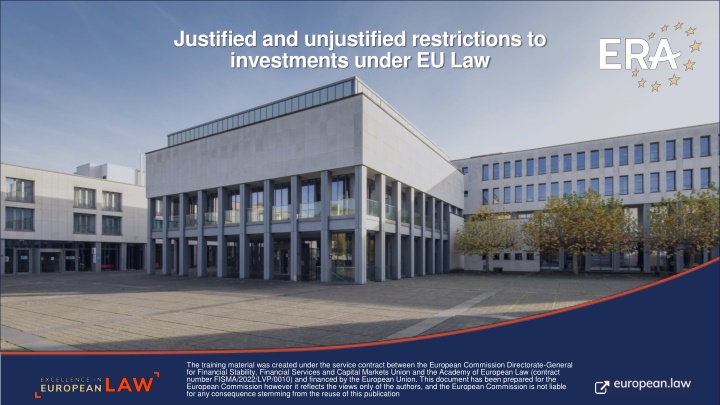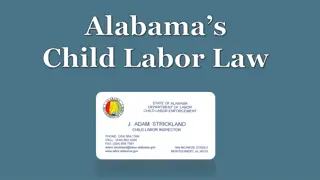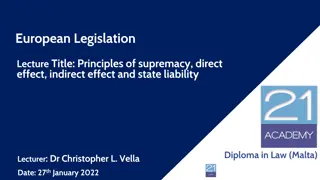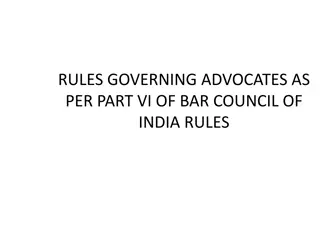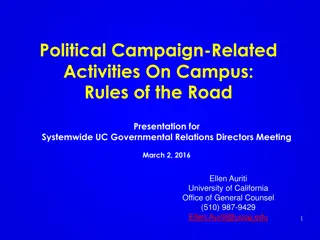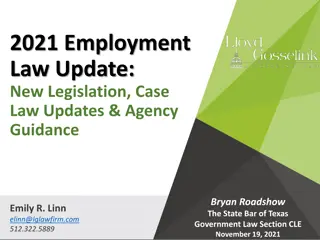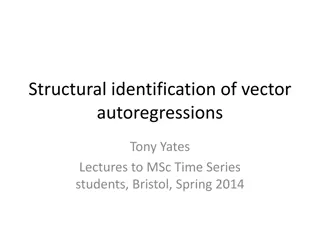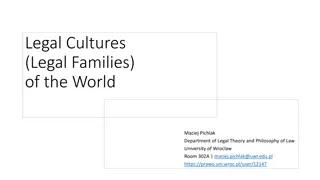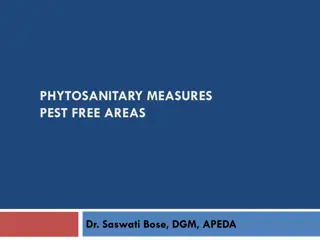Justified and Unjustified Restrictions in EU Law
Explore the coverage of investors and investments under EU Law, including substantive and procedural guarantees, freedoms granted to investors, and available procedural avenues. Learn about international investment law concepts and non-discrimination principles in the EU context.
Download Presentation

Please find below an Image/Link to download the presentation.
The content on the website is provided AS IS for your information and personal use only. It may not be sold, licensed, or shared on other websites without obtaining consent from the author.If you encounter any issues during the download, it is possible that the publisher has removed the file from their server.
You are allowed to download the files provided on this website for personal or commercial use, subject to the condition that they are used lawfully. All files are the property of their respective owners.
The content on the website is provided AS IS for your information and personal use only. It may not be sold, licensed, or shared on other websites without obtaining consent from the author.
E N D
Presentation Transcript
Justified and unjustified restrictions to investments under EU Law The training material was created under the service contract between the European Commission Directorate-General for Financial Stability, Financial Services and Capital Markets Union and the Academy of European Law (contract number FISMA/2022/LVP/0010) and financed by the European Union. This document has been prepared for the European Commission however it reflects the views only of the authors, and the European Commission is not liable for any consequence stemming from the reuse of this publication
I. Who and what is covered under EU Law? If intra-EU BITs cannot protect intra-EU investors anymore, what substantive and procedural guarantees does EU Law offer? II. What are the freedoms granted to investors under EU law (1.) and how can States justify restricting these freedoms (2.)? III. What EU procedural avenues are available to investors? 2 FISMA/2022/LVP/0010 Online training material for judges 2. Justified and unjustified restrictions to investments under EU Law
I. Recap: Who and What is Covered under EU Law 3 FISMA/2022/LVP/0010 Online training material for judges 2. Justified and unjustified restrictions to investments under EU Law
Who and What is Covered? International Investment Law EU Law (2018 COM Communication) Investors No EU concept of investor , BUT - Natural and Legal Persons who are citizens or permanent residents of the other Party - Issues with corporate nationality - Free movement of natural and legal persons, establishment, capital, and services - Issues with free movt. of companies and corporate nationality 4 FISMA/2022/LVP/0010 Online training material for judges 2. Justified and unjustified restrictions to investments under EU Law
Who and What is Covered? International Investment Law EU Law Investment (Salini criteria) No EU concept of investment , BUT - Substantial commitment of capital and resources for a certain duration with the expectation of profit (+ assumption of risk) - Free movement of capital comes closest combined with freedom of establishment and to provide services 5 FISMA/2022/LVP/0010 Online training material for judges 2. Justified and unjustified restrictions to investments under EU Law
International Investment Law EU Law Non-discrimination (National Treatment + MFN Treatment) Non-discrimination based on nationality and other grounds Fair and Equitable Treatment - right to a fair trial - legitimate expectations - transparency - access to justice etc - - right to a fair trial EU concept of legitimate expectations freedom to conduct a business general right to free movement freedom of establishment free movt of services and capital restrictions on free movement - - - - - 6 FISMA/2022/LVP/0010 Online training material for judges 2. Justified and unjustified restrictions to investments under EU Law
International Investment Law EU Law Free Repatriation of Profits Free movement of Capital and Payments Full Protection and Security (civil strife, armed conflict) No real EU equivalent Prohibition of Expropriation without Compensation Prohibition of Expropriation without Compensation 7 FISMA/2022/LVP/0010 Online training material for judges 2. Justified and unjustified restrictions to investments under EU Law
II. 1. Free Movement Protections under EU Law 8 FISMA/2022/LVP/0010 Online training material for judges 2. Justified and unjustified restrictions to investments under EU Law
Free movement as a part of EU Citizenship (Natural Persons) Art. 21 TFEU and Art. 45 EU Charter of Fundamental Rights The right of EU citizens to move freely within the territory of the Member States subject to the limitations included in the EU Treaties and secondary law (such as Directive 2004/38) This Photo by Unknown Author is licensed under CC BY-SA-NC 9 FISMA/2022/LVP/0010 Online training material for judges 2. Justified and unjustified restrictions to investments under EU Law
Freedom of Establishment and Free Movement of Services Applicable Rules Free Movement of Services Freedom of Establishment Articles 55-62 TFEU Articles 49-55 TFEU Directive 38/2004 ( CRD ) Directive 38/2004 ( CRD ) Directive 2005/36 mutual recognition of Directive 2005/36 mutual recognition of professional qualifications professional qualifications Directive 2006/123 (Bolkenstein) CJEU case-law CJEU case-law 10 FISMA/2022/LVP/0010 Online training material for judges 2. Justified and unjustified restrictions to investments under EU Law
Case C-55/94 Gebhard German lawyer moves to Italy and establishes himself permanently as avvocato Para. 25: [T]he concept of establishment within the meaning of the Treaty is therefore a very broad one, allowing a Community national to participate, on a stable and continuous basis, in the economic life of a Member State other than his/her State of origin and to profit therefrom, so contributing to economic and social interpenetration within the Community in the sphere of activities as self- employed persons (see, to this effect, Case 2/74 Reyners v. Belgium [1974] ECR 631, para. 21). Para. 27: [T]he temporary nature of the activities in question has to be determined in the light, not only of the duration of the provision of the service, but also of its regularity, periodicity or continuity. The fact that the provision of services is temporary does not mean that the provider of services within the meaning of the Treaty may not equip himself with some form of infrastructure in the host Member State (including an office, chambers or consulting rooms) in so far as such infrastructure is necessary for the purposes of performing the services in question. Para. 37: It follows, however, from the Court's case law that national measures liable to hinder or make less attractive the exercise of fundamental freedoms guaranteed by the Treaty must fulfil four conditions: they must be applied in a nondiscriminatory manner; they must be justified by imperative requirements in the general interest; they must be suitable for securing the attainment of the objective which they pursue; and they must not go beyond what is necessary in order to attain it (see Case C-19/92 Kraus Land Baden- W rttemberg [1993] ECR I-1663, para. 32). Therefore establishment: an EU national participates in the economic life of another MS on a stable and continuous basis (indefinite period) Duration: regularity, periodicity, continuity is to be taken into account 11 FISMA/2022/LVP/0010 Online training material for judges 2. Justified and unjustified restrictions to investments under EU Law
What is a service? Economic activity Provided on a temporary basis: Gebhard not only duration, but also its regularity, periodicity or continuity For remuneration and a cross-border element is necessary service provider, service receiver and the service itself can move Service provider can have office in host State as long as (s)he is not permanently based there otherwise it is an establishment Residual character applies when the rules on free movement of goods/workers/establishment do not apply 12 FISMA/2022/LVP/0010 Online training material for judges 2. Justified and unjustified restrictions to investments under EU Law
Free movement of capital and payments Art. 63 TFEU - all restrictions on the movement of capital + payments between Member States and between Member States and third countries shall be prohibited Territorial Scope: unlike other freedoms, it covers both intra-EU movement andbetween EU MS and third countries Liberalized much later (concerns of capital flight) and contains more derogations from it than establishment and services (Arts. 64-65 TFEU) Example: Case C-235/17, Commission v Hungary - Case arising out of national legislation extinguishing, without compensation, the rights of usufruct over agricultural and forestry land acquired by legal persons or by natural persons who cannot demonstrate a close family tie with the owner of the land Para. 58: By providing for the extinguishment, by operation of law, of rights of usufruct thus held over agricultural land by nationals of Member States other than Hungary, the contested provision restricts, by virtue of its very subject matter and by reason of that fact alone, the right of the persons concerned to the free movement of capital guaranteed by Article 63 TFEU. Indeed, the contested provision deprives those persons both of the possibility of continuing to enjoy their rights of usufruct, by preventing them, inter alia, from using and farming the land concerned or from letting it to tenant farmers and thereby making money from it, and of the possibility of alienating that right, for example by transferring it back to the owner. That provision is, moreover, liable to deter non-residents from making investments in Hungary in the future (see, to that effect SEGRO and Horv th, C-52/16 and C-113/16, paras 62 to 66). 13 FISMA/2022/LVP/0010 Online training material for judges 2. Justified and unjustified restrictions to investments under EU Law
What is included in capital? No definition in TFEU , but CJEU cases: Capital = Investment of funds (Case 308/86 Lambert) Mortgages (C-222/97 Trummer) Investments in real estate and real property Direct investments into companies (control) + portfolio investments (shares bought on capital markets) Inheritances Gifts in money and kind, etc Agricultural land (C-370/05 Festersen) payments = current payments of services/goods (Case 308/86 Lambert) This Photo by Unknown Author is licensed under CC BY-NC-ND 14 FISMA/2022/LVP/0010 Online training material for judges 2. Justified and unjustified restrictions to investments under EU Law
What is prohibited? Prohibition of direct discrimination (nationality) Case C-577/10 Limosa service providers from EU MS had to send prior declaration to Belgian authorities Prohibition of indirect discrimination Case 33/74van Binsbergen only lawyers resident in the NL could represent clients in NL Non-discriminatory impediments Cases 286/82 and 26/83Luisi and Carbone Italian rule prohibited crossing the border with a certain amount of money. For movement of capital: Direct and indirect discrimination based on nationality, residence, and place where capital is invested (old Art. 67 EEC Treaty) Non-discriminatory measures that significantly hinder market access (C-98/01, Commission v UK non-discriminatory rule that prohibited the acquisition of shares above a certain amount) 15 FISMA/2022/LVP/0010 Online training material for judges 2. Justified and unjustified restrictions to investments under EU Law
II. 2. Justifications to Restrict Free Movement 16 FISMA/2022/LVP/0010 Online training material for judges 2. Justified and unjustified restrictions to investments under EU Law
How to think about Justifications and Derogations Step 1: What type of national measure? (restrictions on the freedom of establishment, free movement of services or capital) Step 2: What type of a breach? (directly or indirectly discriminatory or impediment to market access?) Step 3: Can the breach be justified? (express derogations and/or case-law public interest requirements if proportional) 17 FISMA/2022/LVP/0010 Online training material for judges 2. Justified and unjustified restrictions to investments under EU Law
The Justifications 1. Express Justifications (exhaustive list) [Art. 45.3 (workers); Art. 52 (establishment); Art. 62 (services), Arts. 27-29 Dir 2004/38]: public health public security public policy They can justify any type of treatment!: directly/indirectly discriminatory + impediments to market access 18 18 FISMA/2022/LVP/0010 Online training material for judges 2. Justified and unjustified restrictions to investments under EU Law
The Justifications 2. Public service/exercise official authority [Art. 45.4 TFEU (workers); Art. 51 (establishment); Art. 62 (services)] They can justify any type of treatment!: directly/indirectly discriminatory + impediments to market access 19 FISMA/2022/LVP/0010 Online training material for judges 2. Justified and unjustified restrictions to investments under EU Law
The Justifications The Justifications The Justifications 3. Objective/public interest justifications Created by CJEU case-law NON-exhaustive List Legitimate public interest economic aim not legitimate Must apply without discrimination So far, they can ONLY justify indirectly discriminatory measures + impediments to market access 20 FISMA/2022/LVP/0010 Online training material for judges 2. Justified and unjustified restrictions to investments under EU Law
The Justifications 4. Respect for fundamental rights Case C-230/18 PI v Landespolizeidirektion Tirol Para. 63. It is [ ] settled case-law that the fundamental rights guaranteed by the Charter are applicable in all situations governed by EU law and that they must, therefore, in particular be complied with where national legislation falls within the scope of EU law (AGET Iraklis, C-201/15, para. 62 and the case-law cited). 64. That is in particular the case where national legislation is such as to obstruct one or more of the fundamental freedoms guaranteed by the Treaty and the Member State concerned relies on overriding reasons in the public interest in order to justify such an obstacle. In such a situation, the national legislation concerned can fall within the exceptions thereby provided for only if it complies with the fundamental rights the observance of which is ensured by the Court (AGET Iraklis, C-201/15, para. 63 and the case-law cited). 21 FISMA/2022/LVP/0010 Online training material for judges 2. Justified and unjustified restrictions to investments under EU Law
Proportionality Justifications and derogations must be applied in a proportional manner! The Court of Justice uses a 2 or 3 legged, cumulative test: The measure must be suitable to protect the public interest It must be necessary (no less intrusive alternative exists) All the different interests involved must be carefully weighed and balanced (stricto sensu proportionality) MS must back up justification with evidence! (C-452/01 Ospelt;Joined Cases C 52/16 and C 113/16 Segro and Horvath) 22 FISMA/2022/LVP/0010 Online training material for judges 2. Justified and unjustified restrictions to investments under EU Law
Justification of Restriction of Fundamental Freedoms Case C-230/18 PI v. Landespolizeidirektion Tirol Para. 62: [A] restriction on freedom of establishment provided for in Article 49 TFEU may be justified, if applied without discrimination on grounds of nationality, by overriding reasons in the public interest, provided that it is appropriate for securing the attainment of the objective which it pursues and does not go beyond what is necessary in order to attain it (Memoria and Dall Antonia, C-342/17, para. 51 and the case-law cited). Case C-577/10 Commission v Belgium ("Limosa") Para. 44: Where national legislation falling within an area which has not been harmonised at European Union level is applicable without distinction to all persons and undertakings operating in the territory of the Member State concerned, it may, notwithstanding its restrictive effect on the freedom to provide services, be justified where it meets an overriding requirement in the public interest and that interest is not already safeguarded by the rules to which the service provider is subject in the Member State in which he is established and in so far as it is appropriate for securing the attainment of the objective which it pursues and does not go beyond what is necessary in order to attain it (Arblade and Others, paras 34 and 35; Case C-224/04 Commission v Germany [2006] ECR I-885, para. 31; and Case C-219/08 Commission v Belgium [2009] ECR I-9213, para. 14). Joined Cases C 52/16 and C 113/16 Segro and Horvath Para. 76: [Measures] which restrict the free movement of capital while giving rise in all likelihood to indirect discrimination, are permissible only if they are justified, on the basis of objective considerations independent of the origin of the capital concerned, by overriding reasons in the public interest and if they observe the principle of proportionality, a condition which requires them to be appropriate for ensuring the attainment of the objective legitimately pursued and not to go beyond what is necessary in order for it to be attained (see, to that effect, Geurts and Vogten, C-464/05, para 24, and Hervis Sport s Divatkereskedelmi, C-385/12, paras 41 and 42) 23
Legitimate Expectations under EU Law Developed by the CJEU (Case 111/63 Lemmerz-Werke) as a constitutional principle prudent trader doctrine Example 1: C-322/16 Global Starnet - Case concerning award of new licences for the online operation of gaming Para. 46 It must be pointed out that the principle of legal certainty, the corollary of which is the principle of the protection of legitimate expectations, requires, inter alia, that rules of law be clear, precise and predictable in their effect, especially when they may have adverse consequences on individuals and undertakings (see, Berlington Hungary and Others, C-98/14, para. 77 and the case-law cited). Para. 47 However, a trader may not place reliance on there being no legislative amendment whatever, but can call into question only the arrangements for the implementation of such an amendment (see, Berlington Hungary and Others, C-98/14, para. 78 and the case-law cited). Para. 48 In that regard, it should be noted that the national legislature must provide a transitional period of sufficient length to enable traders to adapt or a reasonable compensation system (see, Berlington Hungary and Others, C-98/14, para. 85 and the case-law cited). 24 FISMA/2022/LVP/0010 Online training material for judges 2. Justified and unjustified restrictions to investments under EU Law
Legitimate Expectations under EU Law Example 2: Joined Cases C-798/18 and C-799/18 Anie and Athesia - Case concerning revision and annulment of the feed-in tariffs for electricity production by solar power. Para. 41: In accordance with the Court s settled case-law, the principle of legal certainty, the corollary of which is the principle of the protection of legitimate expectations, requires that rules of law be clear and precise and that the application of those rules be predictable for individuals, especially where they may have negative consequences for individuals and undertakings. In particular, that principle requires that legislation enables those concerned to know precisely the extent of the obligations which are imposed on them, and that those persons are able to ascertain unequivocally what their rights and obligations are and take steps accordingly (Agrenergy and Fusignano Due, C-180/18, C-286/18 and C-287/18, paras 29 and 30 and the case-law cited). Para. 42: Also in accordance with the Court s settled case-law, the principle of the protection of legitimate expectations may be relied on by any economic operator on whose part national authorities have created reasonable expectations. However, where a prudent and circumspect economic operator could have foreseen the adoption of a measure likely to affect his or her interests, he or she cannot plead that principle if the measure is adopted. Moreover, economic operators cannot justifiably claim a legitimate expectation that an existing situation which may be altered by the national authorities in the exercise of their discretionary power will be maintained (Agrenergy and Fusignano Due, C-180/18, C-286/18 and C-287/18, para. 31 and the case-law cited). Para. 43: It is for the referring court to determine whether national legislation such as that at issue in the main proceedings is consistent with those principles, as the Court of Justice, when giving a preliminary ruling under Article 267 TFEU, has jurisdiction only to provide the national court with all the criteria for the interpretation of EU law which may enable it to determine the issue of compatibility. The referring court may take into account, for that purpose, all relevant factors which are apparent in particular from the terms, objectives or general scheme of the legislation concerned (see, in particular, Agrenergy and Fusignano Due, C-180/18, C-286/18 and C-287/18, paras 33 and 34 and the case-law cited). 25 FISMA/2022/LVP/0010 Online training material for judges 2. Justified and unjustified restrictions to investments under EU Law
III. 3. Further Protections Offered by the EU Charter of Fundamental Rights More information can be found in the 4thpresentation on Case Study 2: Protection of property against expropriation under the Charter of Fundamental Rights and the European Convention of Human Rights 26 FISMA/2022/LVP/0010 Online training material for judges 2. Justified and unjustified restrictions to investments under EU Law
Further protections offered by the EU Charter of Fundamental Rights Art. 16 freedom to conduct a business in accordance with EU and national laws and practices (C-426/11 Alemo-Herron) Art. 17 right to property; deprivation only in the general interest, under the conditions provided by law, subject to fair compensation Art. 47 Right to an effective remedy and a fair trial 27 FISMA/2022/LVP/0010 Online training material for judges 2. Justified and unjustified restrictions to investments under EU Law
But Many of these rights are also protected by the European Convention on Human Rights or form part of the general principles of EU Law Charter same legal value as EU Treaties after Lisbon (Art. 6.1 TEU) Art 51(1) the Charter is addressed to EU institutions and bodies + MS when they are implementing EU Law MS implements EU law (Directive) OR MS law has same scope as EU Law OR MS breach EU norm (C-617/10 Fransson, C- 198/13 Hernandez) 28 FISMA/2022/LVP/0010 Online training material for judges 2. Justified and unjustified restrictions to investments under EU Law
But Art. 52(3) if rights in Charter coincide with ECHR rights, then they shall have the same meaning as ECHR rights Art. 52(4) Charter rights interpreted in harmony with national constitutions Opt outs Poland (Protocol 30 to TFEU) 29 FISMA/2022/LVP/0010 Online training material for judges 2. Justified and unjustified restrictions to investments under EU Law
IV. The Procedural Standards of Protection under EU Law: Overview More information can be found in the 5th presentation on Procedural rights and effective judicial remedies under EU Law 30 FISMA/2022/LVP/0010 Online training material for judges 2. Justified and unjustified restrictions to investments under EU Law
International Investment Law EU Law Domestic Courts Enforcement of EU Law before MS Courts Alternative Dispute Resolution: conciliation, mediation Investor-State arbitration based on treaty, national law or contract Enforcement of EU Law before the CJEU 31 FISMA/2022/LVP/0010 Online training material for judges 2. Justified and unjustified restrictions to investments under EU Law
Judicial Remedies and the Enforcement of EU Law Before CJEU Before MS Courts Before Both Direct Action of Annulment (art.263 TFEU) Direct reliance on EU Law (direct effect) Preliminary references (art.267 TFEU) Action for Failure to Act (art.265 TFEU) Indirect reliance on EU Law (indirect effect) Illegality plea (art.277 TFEU) MS liability for breaches of EU Law EU liability (art.268/340 TFEU) MS must provide equivalent remedies Infringement (art.258-260 TFEU) 32 FISMA/2022/LVP/0010 Online training material for judges 2. Justified and unjustified restrictions to investments under EU Law
Further training material available at: https://elearning-fisma.era.int/ WWW.EUROPEAN.LAW
